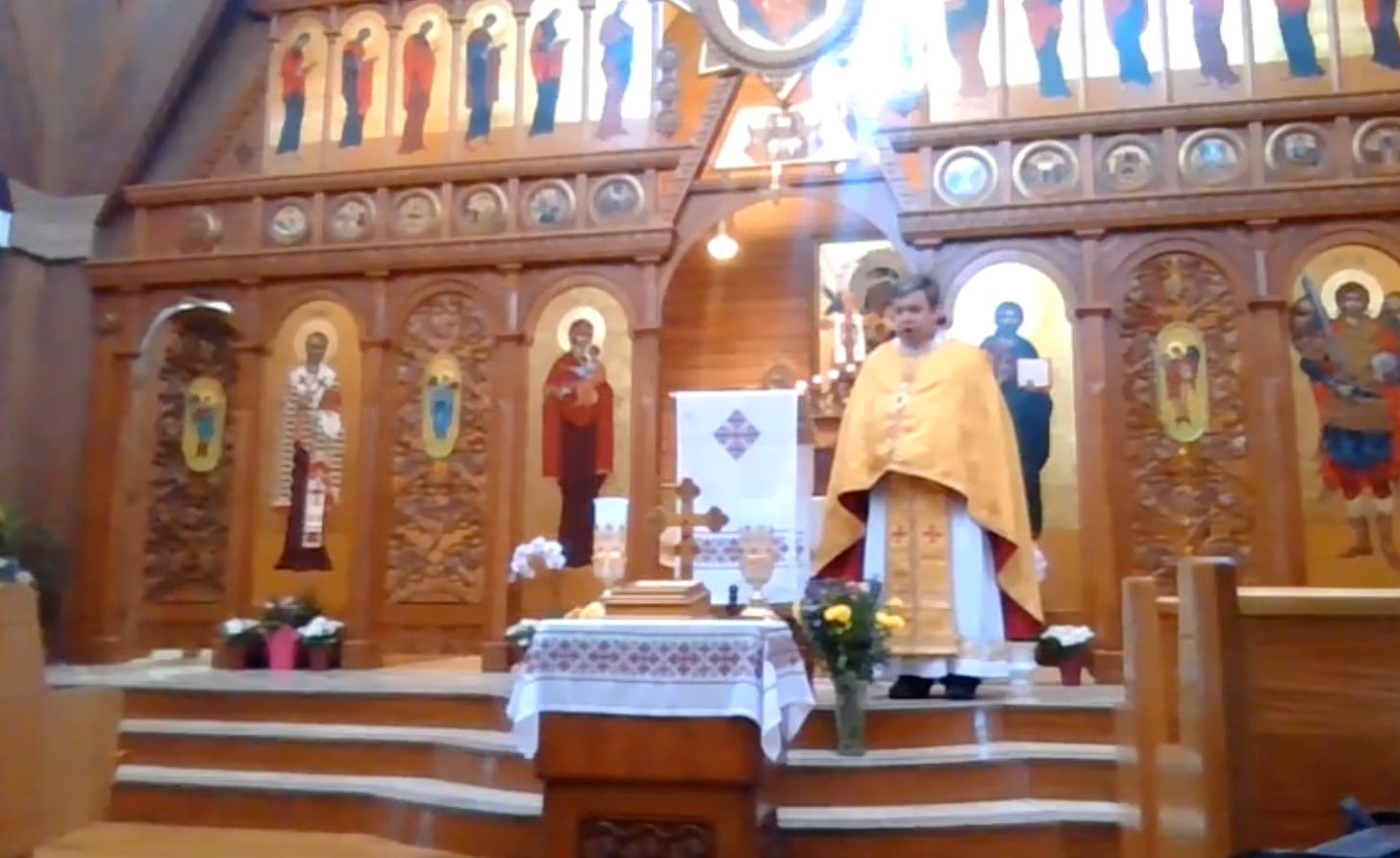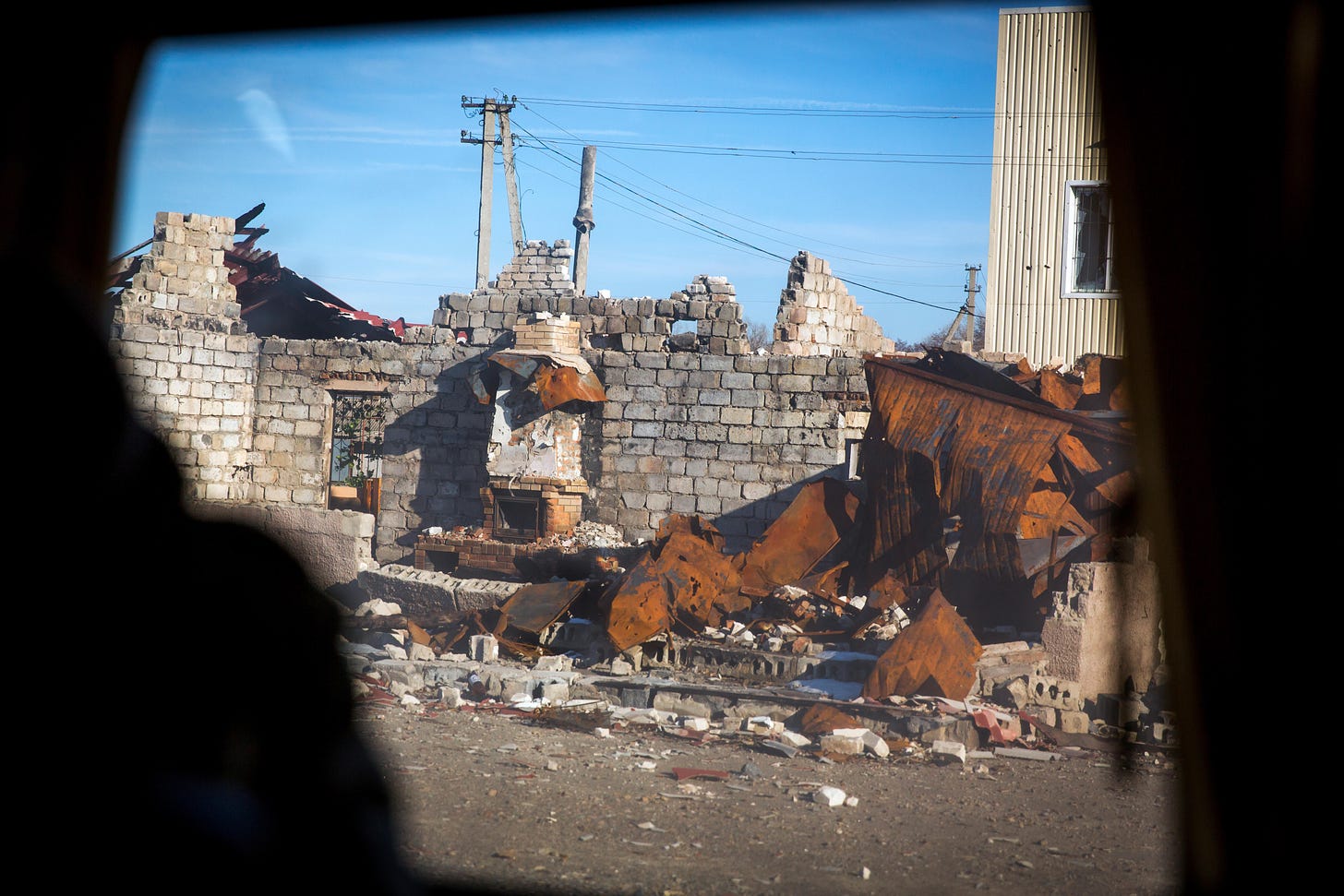Ukrainian Catholic Bishop Andriy Rabiy told The Pillar Thursday that Catholics, including Ukrainians and the Ukraine diaspora around the world, should pray for peace, giving witness to Christian hope amid the Russian invasion of Ukraine.
The bishop added that Ukrainians have faced invasions before, and they do not give up on the defense of their homeland.
“When you hear news like this, first of all you go into shock,” Rabiy told The Pillar.
“You wonder how this is possible, you seek answers. But when you come down a little, you have to pick up your pieces and regroup. We have to keep our hopes up — as Jesus said, we have to keep faith in God.”
Hope in God, the bishop said, “is the key to going through tragic moments like this.”
Speaking to The Pillar Thursday morning, Bishop Rabiy said that while it had been “a sleepless night for many,” it was important for Catholics and Ukrainians to model the virtue of hope.
“Certainly for people who have immediate family in Ukraine, places where they grew up, it hurts to see these terrible events. But it’s not time to start ‘whining’ so to speak, it's time for us to pull ourselves up. As spiritual people this is what we are supposed to show, hope: that God will provide, that everything is in His hands, and believe in it.”
Rabiy himself was born in the Ukrainian city of Lviv, and has been since 2017 an auxiliary bishop of the Ukrainian Church’s Archeparchy of Philadelphia, which covers the eastern half of the United States.
Bringing the Ukrainian community together in prayer, the bishop explained, is an essential part of strengthening faith, and of understanding hope as a spiritual reality instead of an irrational optimism.
“Speaking the words of the Gospel and praying the Psalms, this helps us to pray and to recall the history, how God worked in the past, how He has saved people — so why would we have a reason to doubt that this time he will save us? We believe in Him, but our hope and faith have to be really sincere — even as Jesus said, if it is the size of a mustard seed, the tiniest of all seeds, but we have to show something!”

The fighting continues for control of Kyiv airport Thursday evening, and more than 100,000 people are estimated to have fled their homes after Russia’s renewed invasion of Ukraine began in the early morning hours Feb. 24.
In a series of coordinated Russian air and ground attacks on reportedly military targets, fighting is underway across much of the north, east and south of the country.
Government leaders around the world have condemned the invasion, with many announcing plans for economic sanctions against Russia.
In a statement Thursday morning, Cardinal Pietro Parolin, the Holy See Secretary of State said that “the tragic scenarios that everyone feared are becoming a reality.”
“We do not lose hope for a glimmer of conscience on the part of those who hold in their hands the fortunes of the world. And we continue to pray and fast – as we shall do this coming Ash Wednesday – for peace in Ukraine and in the entire world,” Parolin added.
Meanwhile, the leader of the Ukrainian Greek Catholic Church, Major Archbishop Sviatoslav Shevchuk, is reportedly sheltering along with others under his cathedral in Kyiv.
The bishop told The Pillar that in Ukraine, Catholics are looking for pastors who are present with them in the trauma of an invasion.
“This is the moment when people are looking to see their pastors in their midst,” Rabiy said.
“They are trying to make sense of what is going on, they are overwhelmed, in shock, it is hard to think clearly. Praying together, this is a way to release that anger that many have; I see people leaving the church calmer, more at peace, and this is what matters.”
“We have to, in a sense, accept that this is what is happening, but it cannot paralyze us in our lives — not at all. If anything we must step out and show our virtues!”
The Russian invasion follows months of escalating tensions, stalled diplomatic overtures, and clear signals from Russian president Vladimir Putin that he intended to stage a military intervention.
In the days leading up to the invasion, Putin made a televised speech setting out his pretext for Russian use of force, and effectively claiming that Ukraine was a Soviet creation and had no historical or political legitimacy as an independent country.
Rabiy said Ukrainians have long faced a struggle for their identity.
“There is a historical side to this,” Rabiy told The Pillar. “Ukrainians always find themselves, throughout their history, fighting for their freedom and defending their identity.”
“If you look at the history between Russia and Ukraine, Ukraine has always been an underdog, always a target. For practical reasons, Ukraine is the breadbasket of Europe, and also for cultural reasons, Russia has always been tempted to make it a part of a Russian Empire or Soviet Union.”
“This is not the first time in the history of the nation that it has been invaded by the Russians. And each time the people have been able to rise back up, and this is what we think will happen this time. Yes, the attack is very vicious and the intentions are evil, but at the same time we don’t give up.”
Ukrainian Catholics across the world, and especially in the United States “have to try to show support in every way possible,” the bishop said, “be it through prayer, making calls home, supporting organizations which have already started collecting medical equipment, cash, whatever is necessary that they need over there as they are living through this invasion.”
“I am sure that very soon we will be turning our attention to the people who have survived it all and building their lives back again. But for this moment, what we can do is pray that the fighting will stop, that peace will return.”
In the weeks leading up to the invasion, many including Church leaders in Ukraine, hoped that Pope Francis would agree to a last-minute trip to the country, and that his presence in the capital of Kyiv would forestall any Russian military attack while he was in the city.
While that visit did not happen, Pope Francis has repeatedly called for prayers for peace in Ukraine and declared Ash Wednesday next week to be a day of prayer and fasting for the country.
“The Holy Father has been showing support for Ukraine for quite a long time,” Rabiy told The Pillar. “He has more than once called for days of prayer and fasting, and he has returned to the developing events in his Angelus addresses.”
On Wednesday, on the eve of the invasion, Francis spoke against “the madness of war” and issued an appeal “to everyone, believers and nonbelievers alike. Jesus taught us that the diabolical evil of violence is answered with the weapons of God, with prayer and fasting.”
Bishop Rabiy said that American Catholics can make acts of solidarity with Ukraine: political, spiritual, and practical.
“Reach out to congresspeople and senators,” he said, “tell them that you support Ukraine and want the U.S. government to keep providing assistance, be it military, political, economic, whatever it may be.”
“This is not just about Ukraine itself, we are talking about the future and security of Europe and even of the world,” he said. “Even call the White House and say that this is a serious issue we are deeply concerned about and we must help. Ukraine isn’t asking for troops, or highly developed weapons, but it does need help with essentials at this moment.”
“Also, there are the collections of medical equipment, clothes, other essentials, which are already getting underway. All these are ways to show solidarity, together with our prayers.”
“Every show of fraternity, of solidarity, will be most welcome by the Ukrainian community here in the United States, and the Ukrainian nation.”



